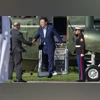In a shocking late-night announcement, South Korean President Yoon Suk Yeol declared martial law on Wednesday, accusing opposition parties of threatening democracy and national stability. This unprecedented move, the first imposition of martial law in over 40 years, immediately raised alarm both domestically and internationally, with troops surrounding Parliament and escalating concerns about the country’s political future.
However, within hours, Yoon reversed his decision after facing strong backlash from the National Assembly and widespread public protests.
Why did South Korea impose martial law?
The crisis unfolded amid a deepening political standoff, primarily over the national budget. Yoon’s administration has faced mounting criticism over its domestic policies, declining public approval, and controversies involving First Lady Kim Keon Hee.
Also read: South Korea's martial law saga: From Rhee to Yoon, a legacy of power crises
In an unexpected address, President Yoon accused opposition forces of engaging in “anti-state activities” that endangered the government. This marked the first martial law declaration since South Korea’s transition to democracy in 1987; the last instance occurred in October 1979, following the assassination of military ruler Park Chung-hee.
Yoon justified the move as a defense of liberal democracy against North Korean threats and internal opposition. The declaration coincided with a budget impasse and an ongoing feud with the opposition, which had sought to impeach three top prosecutors investigating opposition leader Lee, a frontrunner for the 2027 presidential election.
Also Read
Yoon accused the Democratic Party, which holds a parliamentary majority, of sabotaging governance for partisan purposes. Unlike his liberal predecessor Moon Jae-in’s engagement-focused approach to North Korea, Yoon has adopted a hardline stance on Pyongyang’s nuclear ambitions.
What are South Korea’s constitutional provisions on martial law?
The South Korean Constitution allows the president to declare martial law during wartime or comparable national emergencies requiring military intervention to maintain order. Under the decree issued by Army Chief General Park An-su, political activities, strikes, and public gatherings were banned, and the media came under state control. Striking doctors were also ordered to return to work within 48 hours.
The constitution mandates the lifting of martial law if demanded by a majority vote in the National Assembly. However, questions arose about whether the current situation justified such extreme measures.
Martial law lifted after Parliamentary vote
Security forces briefly occupied the National Assembly before lawmakers acted swiftly to counter the president’s decision. A unanimous vote by 190 members nullified the martial law declaration and demanded its immediate lifting.
Also read: South Korea's presidential history: Martial law, coups, and corruption
Following the vote, Yoon rescinded his decree in a televised address at 4:30 am. Military and police personnel withdrew from Parliament grounds, ending the six-hour enforcement of martial law. National Assembly Speaker Woo Won Shik described the law as “invalid” and reaffirmed the legislature’s commitment to protecting democracy.
Reactions to South Korea’s surprise move
The United States expressed relief over the reversal of martial law, while European nations and China stated they were “closely monitoring” the developments. Meanwhile, Russia described the situation as “alarming,” reflecting the international unease surrounding the events.
This dramatic episode has left South Korea grappling with political instability and heightened tensions. The long-term consequences of Yoon’s controversial decision remain uncertain. President Yoon now faces mounting domestic pressure and growing calls for accountability over what has been described as a “tragic miscalculation.” Opposition parties have accused him of insurrection and demanded his resignation, while the country’s largest labour union has launched an indefinite strike to protest the “anti-democratic” decision.

)